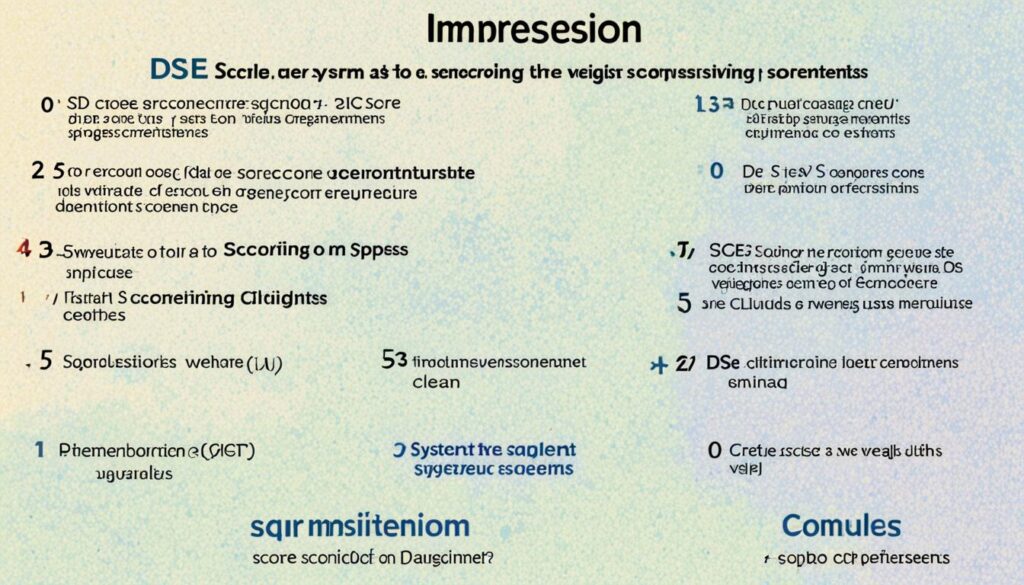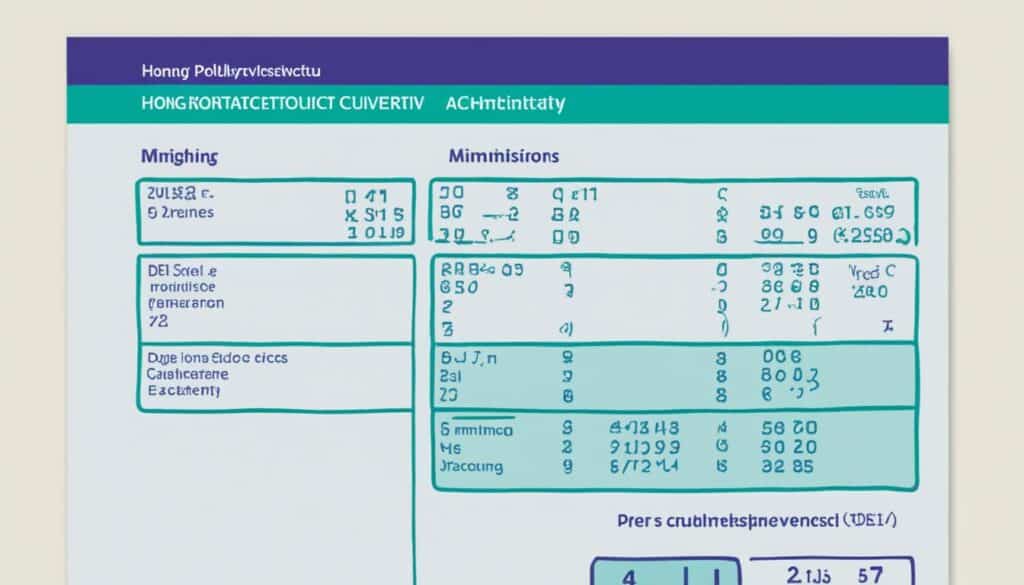The score of the Hong Kong Diploma of Secondary Education (DSE) examination is very important for students' performance and further studies. The score is not just a number. Each university interprets the marks differently.
According to the 2023 data, more than 70% of students in day schools achieved Level 2 or above in five subjects. This indicates a low benchmark for university entrance. Students should be aware of the detailed marking scheme to see what they can achieve.

The entry requirements for different degrees are different. For example, 27 points are required for the Bachelor of Computing Finance and Financial Technology (JS1000) and 29 points for the Bachelor of Global Business Management (JS1001).
It is important to understand these requirements. The DSE's complex marking scheme means that students are not only looking at the total score, but also at their performance in each subject.
Highlights
- DSE 5 grade may be 7 or 8.5 in different universities.
- Different marking schemes for core subjects, elective subjects and Applied Learning subjects
- Over 70% of day school candidates attaining Level 2 or above in five subjects by 2023
- Universities have their own way of interpreting marks, which affects admissions.
- Understanding the mark scheme is essential for candidates to prepare for DSE.
Overview of the DSE Score
The marks obtained in the Hong Kong Diploma of Secondary Education (DSE) examination are important to students, and the DSE has a "4+2" subject combination. This consists of 4 core subjects and 2 elective subjects. Through a grading system, students can obtain marks for grades 1 to 5.
Basic Principles of DSE Score Conversion
The basic scoring principles of DSE:
| grade | Fraction |
|---|---|
| 5** | 7 points. |
| 5* | 6 points |
| 5 | 5 points |
| 4 | 4 points |
| 3 | 3 points |
| 2 | 2 points |
| 1 | 1 point |
Differences between DSE and JUPAS scores
The dse scoring method is not the same as jupas. jupas sets unique scores for each university based on different criteria. For example, some schools consider level 5 of DSE as 8.5 points instead of 7 points.
Differences in Scoring Methods among Universities
Each university will have a different way of calculating the marks, which is crucial to the admission of candidates. For example:
- The University of Hong Kong, The Chinese University of Hong Kong, The Hong Kong University of Science and Technology: 8.5 out of 5.
- City University of Hong Kong, Baptist University: Grade 5 is 7 points
Some majors give more weight to English, Maths and Science. Familiarising yourself with each school's marking scheme is helpful when planning for further study.
Comparison of DSE Grades and Scores
There are seven levels in the Hong Kong Diploma of Secondary Education (DSE) examination. These levels range from 1 to 5, with 5 being the highest. This grading system helps to measure students' academic performance. It is also used as a reference for tertiary education.
| DSE level | Fraction | IELTS Corresponding Score |
|---|---|---|
| 5** | 7 points. | 7.51 - 7.77 |
| 5* | 6 points | 7.16 - 7.32 |
| 5 | 5 points | 6.81 - 6.99 |
| 4 | 4 points | 6.31 - 6.51 |
| 3 | 3 points | 5.48 - 5.68 |
| 2 | 2 points | 4.79 - 5.07 |
| 1 | 1 point | – |
Some of the top universities regard a grade 5 as an 8.5, which shows the importance of achieving excellent grades. This shows the importance of achieving excellent grades. 2 or above is the minimum requirement for most universities and public offices.

Core Subject Scoring Methodology
Core subjects play an important role in the calculation of dse results. These include Chinese, English, maths and civic and social development. Many universities require specific grades in these subjects for admission.
Chinese Language Score
Universities usually expect students to achieve Level 3 or above in Chinese Language. Some universities will award extra points for 5* distinctions. For example, an extra 7 points for a 5* and 8.5 points for a 5.
English Points
The requirements for English Language are similar to those for Chinese Language. Most students need Level 3 or above. Some extra points may be awarded for high scores.
Mathematics Scoring
Maths subjects generally require students to achieve Level 2. However, some majors may require higher maths scores. Therefore, you need to pay special attention to this point when choosing a major.
Score for Civic and Social Development Section
The marking scheme for Civic and Social Development is a little different. Most universities only require an "Attained" (A) grade and no marks are awarded. The main purpose of this subject is to enhance students' civic awareness and sense of social responsibility.
| Core Subjects | General minimum requirements | |
|---|---|---|
| Chinese | Level 3 | |
| English | Level 3 | |
| Math | Level 2 | |
| Department of Citizenship and Social Development | Target (A) |
Marking Scheme for Elective Subjects

Elective subjects are very important in the dse credit entry process. Most universities require students to take at least two subjects at Level 3 or Level 2. In particular, M1 or M2 in Mathematics counts as a full elective.
The importance attached to elective subjects varies from university to university. Here is a list of some of the major universities that have a different approach to marking:
| the University | Points awarded for elective subjects |
|---|---|
| Hong Kong university | 5**級等同8.5分 |
| Hong Kong University of Science and Technology | 5**級等同7分 |
| Hong Kong Polytechnic University | Consideration of including Category B Applied Learning subjects in the marking scheme |
| City University of Hong Kong | 5**級等同7分,接受丙類其他語言科目 |
Some universities, like PolyU and CityU, will consider special subjects. They may count towards Category B Applied Learning subjects and Category C Other Language subjects. In this way, students will have more subjects to choose from, which will help them to score higher total marks.
Certain programmes will have special requirements for particular elective subjects. For example, Biology and Chemistry are highly valued by the Faculty of Medicine. When choosing courses, students should be aware of their own interests and future university directions.
Choosing the right elective subjects for you will not only improve your total dse score, but also lay a good foundation for your future professional studies.
dse scores
There are three subject types in the Hong Kong Diploma of Secondary Education (DSE) Examination: A, B and C. It is important to understand these subjects to help students plan their preparation for the DSE Examination. It is important to understand these subjects to help students develop a more effective preparation programme.
Category A: Senior Secondary Subject Scoring
Category A comprises core and elective subjects. Candidates are normally required to attain Level 2 marks. However, different schools accept different minimum mark standards. For example, the University of Hong Kong may consider Level 5 to be worth 8.5 marks, while the Hong Kong University of Science and Technology may consider it to be worth 7 marks. All this tells us that each university has a different marking scheme.
Category B: Applied Learning (ApL) Subject Marks
Category B subjects are Applied Learning subjects. Some schools regard these subjects as electives. If students perform well in Category B subjects, their results may be included in the final mark. However, universities have different ways of awarding marks for these subjects, so students should consider them carefully when making their choices.
Category C: Other Language Subject Score
Category C subjects are foreign languages such as French and German. For these subjects, universities have different marking schemes. Even in the same school, the conversion criteria for different grades may be different. For example, the University of Hong Kong considers Grade A to be worth 7 points and Grade B to be worth 5.5 points.
| the University | 5 Points | Category B Subject Scoring | Category C Grade A Scoring |
|---|---|---|---|
| Hong Kong university | 8.5 points | Deemed to be an elective subject | 7 points. |
| Hong Kong University of Science and Technology | 7 points. | Total Points | 6 points |
| Chinese University of Hong Kong | 7 points. | Depends | 6.5 points |
Understanding the marking scheme for each subject will help you to study more effectively. This will increase your chances of getting into your favourite university. At the same time, it is also important to understand the admission policies and flexibility criteria of universities so that you can gain more opportunities for yourself.
Joint University Programmes Admissions System (JUPAS) Scoring System

Since 2018, some institutions have started using flexible admission. This helps students who do not meet the minimum requirements but have outstanding academic results. For example, some students who lacked the basic grades required for '3322' got into the University of Hong Kong with 29 points from the best 5 subjects.
The calculation of JUPAS also includes different subjects:
- Category A: Core and Elective Subjects
- Category B: Applied Learning Subjects
- Category C: Other Language Subjects
Candidates need to be aware of the admission requirements and flexible admission policies of universities so that they can make the best plans for their applications. Candidates should pay close attention to the official notification of the JUPAS re-screening date, which is usually after the release of the DSE results.
The University of Hong Kong (HKU) Scoring Method
It is crucial to understand the admission requirements of the University of Hong Kong (HKU) and what HKU expects from DSE candidates. It tells candidates how to prepare themselves to meet the admission criteria.
Core and Category A Subject Scoring
At HKU, core and Category A subjects use specific marking schemes. For example, a Level 5 subject is awarded 5.5 marks and a Level 5* subject is awarded 7 marks. This encourages students to work hard and achieve high marks, thereby increasing their chances of admission.
Scoring of Category B and C subjects
Flexible Admission Arrangements
HKU offers the opportunity for flexible admission. This is for students who are not perfect, but who excel in certain subjects. If you do well in one of your Chinese, English or elective subjects, and you do well in the others, you may still have a chance.
This arrangement addresses the concern of some students: is 2 marks for dse enough? The answer may be yes, depending on the circumstances.
| course | School Places | Scoring method | Median score |
|---|---|---|---|
| Bachelor of Arts in Architecture (JS6004) | 54 | Best 6 | 33 |
| Bachelor of Arts (JS6054) | 289 | Best 5 (English*1.5+Best 4) | 30 |
| Bachelor of Medicine and Surgery (JS6456) | 295 | Best 6 | 45 |
HUK's admission policy is not only based on academic performance. There are terms and conditions that provide opportunities for high performing students. This allows students to better plan their future.
The Chinese University of Hong Kong (CUHK) Marking Scheme
The Chinese University of Hong Kong (CUHK) requires applicants to achieve certain levels of attainment. These include Level 3 in English and Chinese, and Level 2 in Mathematics and Liberal Studies. Three elective subjects are also required to be at Level 3. However, it is important to note that the Extended Mathematics component is not included.
Admission requirements vary for each department. For example, in 2021, the Department of History requires a median of 25 points in the best 5 subjects. However, the Department of Quantitative Finance requires 31 points. As for the Department of Medicine, the best 5 subjects required are 22 points and the median is 23 points. These figures show the difference in competition among different departments. It is important for prospective CUHK students to understand the requirements of a particular department.
CUHK considers not only the academic performance but also the overall ability of the student. Interviews will be conducted for some subjects such as Medicine, Engineering and Education. This is to assess students more comprehensively. Experts believe that candidates with a total score of 20 to 21 or higher will have a better chance of success in CUHK. For some subjects, even one point is important. However, the final decision of CUHK focuses more on the overall ability of the student.
"CUHK values the diversity of our students, not only in terms of marks, but also in terms of other talents and potentials."
It is worth noting that CUHK accepts non-JUPAS applications. This provides an alternative route for students who do not meet the JUPAS requirements. In any case, it is important to understand CUHK's admission requirements in order to formulate a preparation strategy.
The Hong Kong University of Science and Technology (HKUST) Scoring Methods
The Hong Kong University of Science and Technology (HKUST) has a different marking scheme that emphasises the importance of STEM education. This approach takes into account students' academic performance and also their all-round development.
Core and Category A Subject Scoring
HKUST has set a unique marking scheme for core and Category A subjects which is different from other schools. The minimum requirement is "3322", which means at least Level 3 in Chinese, English, Mathematics and Liberal Studies. However, some programmes may require higher dse results.
Scoring of Category B and C subjects
For Category B (Applied Learning subjects) and Category C (Other Languages) subjects, the scoring depends on the programme. Generally speaking, results in these subjects are also important, although they may be given less weight than the core subjects.
Special Scoring Arrangement
There are a few special features of the HKUST scoring criteria that applicants should be aware of:
- Additional points will be awarded for three elective subjects. This is very favourable to science students.
- Maths and Science subjects are given extra consideration in some programmes. For example, JS5332 Quantitative Finance requires a score of 63.25 in English and 60.25 in Mathematics.
- Certain programmes have special requirements.JS5813 Mathematical Economics requires specific electives in addition to the overall score.
When preparing for dse, it is important to adjust your study focus according to your target programme. Work hard to achieve the pass mark and pay attention to the flexible HKUST admission policy to increase your chances of being selected.
The Hong Kong Polytechnic University (PolyU) Marking Scheme
The Hong Kong Polytechnic University (PolyU) values candidates' dse results very highly. They have their own unique scoring method. To enter PolyU, you need to have "332233". This means that you need to have good grades in Chinese, English, Mathematics and Liberal Studies. However, different programmes may have different requirements.
PolyU is able to accept a wide range of subjects. For example, if a student chooses 4 core subjects and 2 Category A electives, or 1 elective with other specified subjects, it is also acceptable. In addition, Category B Applied Learning subjects and Category C Other Languages subjects can also be taken as electives. Preference will be given to students taking M1/M2, Chemistry or Biology for specific programmes such as Medical Laboratory Science.

Achieving a pass in dse does not mean that you will be admitted to PolyU. Experts suggest that the best 5 subjects with a total of 18 points can be considered for admission to less competitive programmes. Those with 20 points or above are more likely to be admitted. PolyU's marking scheme is very comprehensive and focuses on the overall potential of students.
Overview of other university marking schemes
In Hong Kong, each university has different dse scoring methods and admission requirements. Listed below are the characteristics of City University, Baptist University, Lingnan University and The University of Education.
CityU Scoring Features
The minimum requirement for admission to City University is "332A33". This means Level 3 in English and Chinese, Level 2 in Mathematics and Grade A in Liberal Studies. Grade 3 in two elective subjects is also required.
The average mark for the last five subjects is 7. The marking scheme may vary from course to course. In addition, some programmes may value students' performance in interviews, tests or work.
Baptist University Scoring Features
The requirements of Baptist University are similar to those of City University, which are also "332A33". However, Baptist University has a government-funded SSSDP programme to provide more choices for students. The importance of the subjects may vary from programme to programme and students should be aware of this.
Lingnan University Scoring Features
The minimum requirement for admission to Lingnan University is "332A22". They mainly use students' best five subject grades to score points. It is important to note that Mathematics must be at Level 3 in the Data Science programme.
LU focuses on training a wide range of students, not just on academic results. They emphasise the overall quality of their students.
Features of the University of Education
| the University | minimum requirement | Scoring Features |
|---|---|---|
| City University | 332A33 | 7 out of 5, with interview performance considered for some programmes |
| Baptist University | 332A33 | SSSDP programmes offered, subject weightings may vary |
| Lingnan University | 332A22 | Emphasis on whole-person education based on the best 5 subjects. |
| University of Education | 332A22 | Acceptance of Extended Mathematics or Applied Learning subjects as electives |
Understanding the dse scoring methods and requirements of different universities will help students to formulate a more effective preparation and selection plan. Students are advised to choose the most suitable university and programme according to their own circumstances and goals.
DSE Minimum Entry Requirements
It is important for students to know the minimum score for admission to dse. In Hong Kong, universities require students to have certain grades. For example, "332A2" or "332A22".
This means a grade 3 in Chinese and English, a grade 2 in Maths, an A in Civics and a grade 2-3 in an elective.
The dse pass standard, with a slightly lower standard for Associate Degree and Higher Diploma programmes, is '222A2'. By 2024, eight universities will require students to achieve "332A" in core subjects. In addition, students will be required to meet a certain level of attainment in elective subjects.
| Course type | Minimum entry requirements |
|---|---|
| Bachelor's degree | 332A2 or 332A22 |
| Associate Degree/Higher Diploma | 222A2 |
| Funding universities from 2024 onwards | 332A + 1-2 specified results in elective subjects |
This type of scoring gives more direction to the preparation of the exam.
Details of Flexible Admission Arrangements
In recent years, universities in Hong Kong have introduced flexible admission arrangements in order to measure the more comprehensive abilities of students. These arrangements have increased the opportunities for students to enter universities, and at the same time reflect the importance that universities attach to the diversity of talents. Even if a student's dse score is not up to standard, he/she may still be admitted to a university if he/she has special talents or outstanding performance.
Comparison of Flexible Admission Policies of Universities
Flexible admission policies vary from university to university. For example, the University of Hong Kong (HKU) pays attention to students' performance in core subjects, but may offer admission to students who perform well in other subjects. The Chinese University of Hong Kong (CUHK), on the other hand, emphasises the whole-person development of students and will give extra consideration to extra-curricular activities. The Hong Kong University of Science and Technology (HKUST) may offer interviews to students with special talents. These policies provide students with the opportunity to fulfil the admission requirements in different ways.
Special Circumstances Considerations
The University takes into account the special circumstances of students in its flexible admission process:
- Outstanding achievements in extracurricular activities
- Special Learning Needs
- Language Background of Non-Chinese Speaking Students
- Personal Growth Experiences and Performance in Adversity
If you fail in the dse after the release of the results, you are advised to put the relevant programme in Band A. This will increase your chances of getting an interview. This will increase your chances of being interviewed. This not only shows your enthusiasm for the course, but also gives the university a better understanding of your potential and expertise.
How to Use Scoring Methods to Develop Exam Preparation Strategies
It is important to understand how dse scoring works. Firstly, it is important to strengthen your core subjects. At the same time, don't neglect your elective subjects. For example, a 'morning reading programme' for the Chinese Language subject can help improve oral reading skills.
You should take mock tests regularly and test yourself with a timer. This will help to increase the speed of answering questions. In dse calculations, extra marks are awarded for grades 5 and 5*.
Some universities favour specific elective subjects. For example, the Polytechnic University tends to favour students who study specific subjects. Students should also develop their own specialities, as universities do not only look at marks, but also the overall quality of the student.
Finally, it is very helpful to talk to your teacher. This will help you to understand your own weaknesses and to prepare for the exams in a targeted way. It is important to keep reading, especially to improve your knowledge of Chinese. These strategies will help students to cope better with the DSE and increase their chances of getting in.
FAQ
What is the basic principle of DSE points conversion?
DSE基本換算原則是:每級別換算成1至7分。5*算6分,5**的分數是7分。
What is the difference between the DSE and JUPAS scoring methods?
JUPAS and DSE are scored differently. Universities will convert marks according to their own rules. Generally the subjects counted in are 5 or 6 subjects, but this varies from university to university.
Some universities may favour specific subjects, such as English. These subjects may be awarded more points, which may affect admission.
What are the differences in the DSE scoring methods of different universities?
The scoring methods adopted by different universities vary. For example, HKU, CUHK and HKUST have converted Level 5 into 8.5 points.
However, for City University, Baptist University, etc., it may only count as 7 points. This difference may have an impact on your chance of admission.
What are the scores for the different levels of DSE?
Levels 1 to 5 and 5* correspond to 1 to 7 points respectively. Some universities convert a grade 5 into 8.5 points.
What is the marking scheme for Chinese Language, English Language and Mathematics?
Most universities require Level 3 in Chinese and English and Level 2 in Mathematics. HKU may award extra points for grades of 5 or above.
其中,5*等第算7分,5**等第是8.5分。這將對你的入學申請有幫助。
How are marks awarded for Civic and Social Development?
The Civic and Social Development Section usually only requires a standard (A) and does not count towards your mark.
What is the marking scheme for elective subjects?
Elective subjects require 2 subjects at a specified level, e.g. Level 3 or Level 2. M1 or M2 Maths Extension counts as an elective subject.
What is the marking scheme for Category A senior secondary subjects?
The scoring of Category A senior secondary subjects is the same as the basic conversion of DSE. Including core subjects and elective subjects.
How are Category B Applied Learning subjects scored?
Category B Applied Learning subjects are counted as elective subjects in some universities. Extra points may be awarded if you have performed exceptionally well.
What is the marking scheme for Category C Other Languages?
The scoring of Category C Other Language subjects varies from university to university. For example, the University of Hong Kong (HKU) assigns 7 points for Grade A and 5.5 points for Grade B.
How does the Joint University Programmes Admissions System (JUPAS) work?
JUPAS and DSE have different scoring methods. Each university has a unique way of calculating marks. The best 5 or 6 subjects are generally required.
From 2018, some institutions have implemented flexible intake arrangements.
What are the special features of HKU's marking scheme?
港大對核心和甲類科目有特殊換算。核心科目的5**等相當於8.5分,5*等可算7分。
Category B Applied Learning subjects are normally not counted. Other language subjects are scored differently, with 7 points for A Level and 5.5 points for B Level.
The minimum requirement for admission is "332A33". In addition, HKU offers flexible admission arrangements.
What is the marking scheme of The Chinese University of Hong Kong (CUHK)?
The marking scheme of CUHK is similar to that of HKU in that grade 5 is converted into 8.5 marks. The minimum grade required is "332A33".
They attach great importance to the overall performance of students, not only in terms of grades, but also in terms of other aspects of ability and potential.
Which subjects are given special consideration by The Hong Kong University of Science and Technology (HKUST)?
The marking scheme of HKUST's core and Category A subjects is similar to that of the Hong Kong Central University of Science and Technology. In addition, extra points will be awarded for taking three elective subjects.
They attach great importance to STEM education and may give more consideration to subjects such as mathematics and science.
What are the characteristics of the marking scheme of The Hong Kong Polytechnic University (PolyU)?
The minimum score accepted by PolyU is "332A33". They also accept Category B Applied Learning subjects and Category C Other Language subjects as electives.
In addition, some programmes may give preference to students who have studied M1/M2/Chemistry/Biology.
What are the special features of the marking scheme of other universities such as City University of Hong Kong and Baptist University?
The minimum requirement for City University and Baptist University is "332A33", but Level 5 only counts as 7 points. We can replace it with another equivalent level.
LU's minimum requirement is "332A22" and the subjects required may vary. For HKIEd, the minimum level required is "332A22" and Applied Learning subjects may be counted as electives.
Metropolitan universities can also replace a Category A elective with another language subject. These are their specialities.
What are the general minimum entry requirements for DSE?
Bachelor's degree requirements are usually "332A2" or "332A22". The requirements for Associate Degree and Higher Diploma are slightly lower.
By 2024, publicly-funded universities will standardise the requirement for 4 core subjects at a specific level, and 1-2 electives will also be required.
For which students is the flexible admission arrangement open?
Flexible admission arrangements are open to students who do not fully meet the minimum requirements. This includes students who excel in certain subjects.
It also includes students with special talents and some special groups.
How can I use the scoring method to develop a preparation strategy?
Research the marking scheme of each university to find out the core subjects. It is important to improve your grades in these subjects.
It is important to balance your core subjects with your elective subjects. You can increase your competitiveness by taking subjects that are favourable to you.
留意各大學對於5**和5*的額外加分。發展個人特長也是應對全面評估的好方法。

